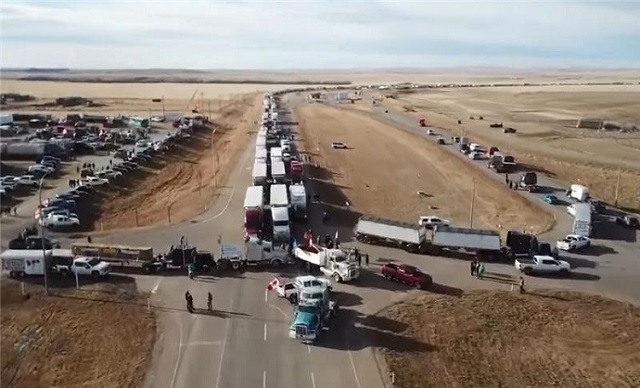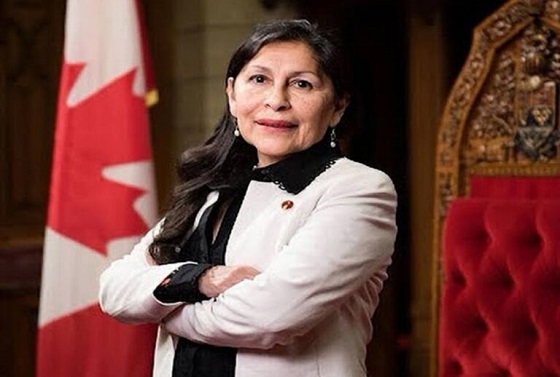Alberta
‘Fireworks’ As Defence Opens Case In Coutts Two Trial

From the Frontier Centre for Public Policy
By Ray McGinnis
Anthony Olienick and Chris Carbert are on trial for conspiracy to commit murder and firearms charges in relation to the Coutts Blockade into mid-February 2022. In opening her case before a Lethbridge, AB, jury on July 11, Olienick’s lawyer, Marilyn Burns stated “This is a political, criminal trial that is un Canadian.” She told the jury, “You will be shocked, and at the very least, disappointed with how Canada’s own RCMP conducted themselves during and after the Coutts protest,” as she summarized officers’ testimony during presentation of the Crown’s case. Burns also contended that “the conduct of Alberta’s provincial government and Canada’s federal government are entwined with the RCMP.” The arrests of the Coutts Four on the night of February 13 and noon hour of February 14, were key events in a decision by the Clerk of the Privy Council, Janice Charette, and the National Security Advisor to the Prime Minister, Jody Thomas, to advise Prime Minister Justin Trudeau to invoke the Emergencies Act. Chief Justice Paul Rouleau, in submitting his Public Order Emergency Commission Report to Parliament on February 17, 2023, also cited events at the Coutts Blockade as key to his conclusion that the government was justified in invoking the Emergencies Act.
Justice David Labrenz cautioned attorney Burns regarding her language, after Crown prosecutor Stephen Johnson objected to some of the language in the opening statement of Olienick’s counsel. Futher discussion about the appropriateness of attorney Burns’ statement to the jury is behind a publication ban, as discussions occurred without the jury present.
Justice Labrenz told the jury on July 12, “I would remind you that the presumption of innocence means that both the accused are cloaked with that presumption, unless the Crown proves beyond a reasonable doubt the essential elements of the charge(s).” He further clarified what should result if the jurors were uncertain about which narrative to believe: the account by the Crown, or the account from the accused lawyers. Labrenz stated that such ambivalence must lead to an acquittal; As such a degree of uncertainty regarding which case to trust in does not meet the “beyond a reasonable doubt” threshold for a conviction.”
On July 15, 2024, a Lethbridge jury heard evidence from a former employer of Olienicks’ named Brian Lambert. He stated that he had tasked Olienick run his sandstone quarry and mining business. He was a business partner with Olienick. In that capacity, Olienick made use of what Lambert referred to as “little firecrackers,” to quarry the sandstone and reduce it in size. Reducing the size of the stone renders it manageable to get refined and repurposed so it could be sold to buyers of stone for other uses (building construction, patio stones, etc.) Lambert explained that the “firecrackers” were “explosive devices” packaged within tubing and pipes that could also be used for plumbing. He detailed how “You make them out of ordinary plumbing pipe and use some kind of propellant like shotgun powder…” Lambert explained that the length of the pipe “…depended on how big a hole or how large a piece of stone you were going to crack. The one I saw was about six inches long … maybe an inch in diameter.”
One of Olienick’s charges is “unlawful possession of an explosive device for a dangerous purpose.” The principal evidence offered up by RCMP to the Crown is what the officers depicted as “pipe bombs” which they obtained at the residence of Anthony Olienick in Claresholm, Alberta, about a two-hour drive from Coutts. Officers entered his home after he was arrested the night of February 13, 2022. Lambert’s testimony offers a plausible common use for the “firecrackers” the RCMP referred to as “pipe bombs.” Lambert added, these “firecrackers” have a firecracker fuse, and in the world of “explosive” they are “no big deal.”
Fellow accused, Chris Carbert, is does not face the additional charge of unlawful possession of explosives for a dangerous purpose. This is the first full week of the case for the defence. The trial began on June 6 when the Crown began presenting its case.
Ray McGinnis is a Senior Fellow with the Frontier Centre for Public Policy who recently attended several days of testimony at the Coutts Two trial.
Alberta
IEA peak-oil reversal gives Alberta long-term leverage

This article supplied by Troy Media.
The peak-oil narrative has collapsed, and the IEA’s U-turn marks a major strategic win for Alberta
After years of confidently predicting that global oil demand was on the verge of collapsing, the International Energy Agency (IEA) has now reversed course—a stunning retreat that shatters the peak-oil narrative and rewrites the outlook for oil-producing regions such as Alberta.
For years, analysts warned that an oil glut was coming. Suddenly, the tide has turned. The Paris-based IEA, the world’s most influential energy forecasting body, is stepping back from its long-held view that peak oil demand is just around the corner.
The IEA reversal is a strategic boost for Alberta and a political complication for Ottawa, which now has to reconcile its climate commitments with a global outlook that no longer supports a rapid decline in fossil fuel use or the doomsday narrative Ottawa has relied on to advance its climate agenda.
Alberta’s economy remains tied to long-term global demand for reliable, conventional energy. The province produces roughly 80 per cent of Canada’s oil and depends on resource revenues to fund a significant share of its provincial budget. The sector also plays a central role in the national economy, supporting hundreds of thousands of jobs and contributing close to 10 per cent of Canada’s GDP when related industries are included.
That reality stands in sharp contrast to Ottawa. Prime Minister Mark Carney has long championed net-zero timelines, ESG frameworks and tighter climate policy, and has repeatedly signalled that expanding long-term oil production is not part of his economic vision. The new IEA outlook bolsters Alberta’s position far more than it aligns with his government’s preferred direction.
Globally, the shift is even clearer. The IEA’s latest World Energy Outlook, released on Nov. 12, makes the reversal unmistakable. Under existing policies and regulations, global demand for oil and natural gas will continue to rise well past this decade and could keep climbing until 2050. Demand reaches 105 million barrels per day in 2035 and 113 million barrels per day in 2050, up from 100 million barrels per day last year, a direct contradiction of years of claims that the world was on the cusp of phasing out fossil fuels.
A key factor is the slowing pace of electric vehicle adoption, driven by weakening policy support outside China and Europe. The IEA now expects the share of electric vehicles in global car sales to plateau after 2035. In many countries, subsidies are being reduced, purchase incentives are ending and charging-infrastructure goals are slipping. Without coercive policy intervention, electric vehicle adoption will not accelerate fast enough to meaningfully cut oil demand.
The IEA’s own outlook now shows it wasn’t merely off in its forecasts; it repeatedly projected that oil demand was in rapid decline, despite evidence to the contrary. Just last year, IEA executive director Fatih Birol told the Financial Times that we were witnessing “the beginning of the end of the fossil fuel era.” The new outlook directly contradicts that claim.
The political landscape also matters. U.S. President Donald Trump’s return to the White House shifted global expectations. The United States withdrew from the Paris Agreement, reversed Biden-era climate measures and embraced an expansion of domestic oil and gas production. As the world’s largest economy and the IEA’s largest contributor, the U.S. carries significant weight, and other countries, including Canada and the United Kingdom, have taken steps to shore up energy security by keeping existing fossil-fuel capacity online while navigating their longer-term transition plans.
The IEA also warns that the world is likely to miss its goal of limiting temperature increases to 1.5 °C over pre-industrial levels. During the Biden years, the IAE maintained that reaching net-zero by mid-century required ending investment in new oil, gas and coal projects. That stance has now faded. Its updated position concedes that demand will not fall quickly enough to meet those targets.
Investment banks are also adjusting. A Bloomberg report citing Goldman Sachs analysts projects global oil demand could rise to 113 million barrels per day by 2040, compared with 103.5 million barrels per day in 2024, Irina Slav wrote for Oilprice.com. Goldman cites slow progress on net-zero policies, infrastructure challenges for wind and solar and weaker electric vehicle adoption.
“We do not assume major breakthroughs in low-carbon technology,” Sachs’ analysts wrote. “Even for peaking road oil demand, we expect a long plateau after 2030.” That implies a stable, not shrinking, market for oil.
OPEC, long insisting that peak demand is nowhere in sight, feels vindicated. “We hope … we have passed the peak in the misguided notion of ‘peak oil’,” the organization said last Wednesday after the outlook’s release.
Oil is set to remain at the centre of global energy demand for years to come, and for Alberta, Canada’s energy capital, the IEA’s course correction offers renewed certainty in a world that had been prematurely writing off its future.
Toronto-based Rashid Husain Syed is a highly regarded analyst specializing in energy and politics, particularly in the Middle East. In addition to his contributions to local and international newspapers, Rashid frequently lends his expertise as a speaker at global conferences. Organizations such as the Department of Energy in Washington and the International Energy Agency in Paris have sought his insights on global energy matters.
Troy Media empowers Canadian community news outlets by providing independent, insightful analysis and commentary. Our mission is to support local media in helping Canadians stay informed and engaged by delivering reliable content that strengthens community connections and deepens understanding across the country.
Alberta
READ IT HERE – Canada-Alberta Memorandum of Understanding – From the Prime Minister’s Office

-

 Alberta5 hours ago
Alberta5 hours agoFrom Underdog to Top Broodmare
-

 Banks2 days ago
Banks2 days agoThe Bill Designed to Kill Canada’s Fossil Fuel Sector
-

 Alberta1 day ago
Alberta1 day agoAlberta and Ottawa ink landmark energy agreement
-

 armed forces2 days ago
armed forces2 days ago2025 Federal Budget: Veterans Are Bleeding for This Budget
-

 Artificial Intelligence2 days ago
Artificial Intelligence2 days agoTrump’s New AI Focused ‘Manhattan Project’ Adds Pressure To Grid
-

 International1 day ago
International1 day agoAfghan Ex–CIA Partner Accused in D.C. National Guard Ambush
-

 Carbon Tax1 day ago
Carbon Tax1 day agoCanadian energy policies undermine a century of North American integration
-

 International1 day ago
International1 day agoIdentities of wounded Guardsmen, each newly sworn in






